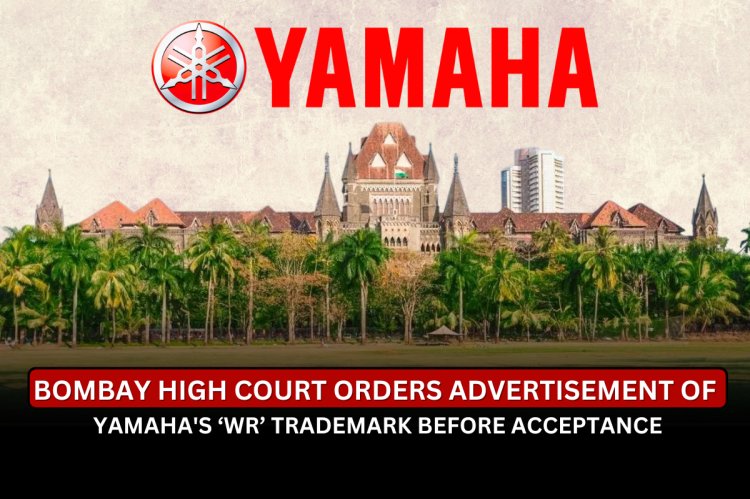Bombay High Court Orders Advertisement of Yamaha's ‘WR’ Trademark Before Acceptance
Explore how the Bombay High Court overturned the Trade Marks Registry’s refusal of Yamaha’s ‘WR’ trademark, emphasizing transborder reputation, international use, and procedural fairness under the Trade Marks Act, 1999.

INTRODUCTION
Trademark disputes involving internationally reputed brands often hinge on balancing global goodwill with domestic legal thresholds. The Bombay High Court's ruling in Yamaha Hatsudoki Kabushiki Kaisha v. Registrar of Trade Marks reiterates that international usage and transborder reputation cannot be ignored during trademark registration. The Registrar turned down Yamaha’s trademark application for “WR” by relying on Section 11(1) of the Trade Marks Act; however, the High Court observed that the refusal lacked sufficient reasoning and procedural care.
LEGAL PROVISIONS
1. Section 11(1)(b) of the Trade Marks Act, 1999
“A trade mark shall not be registered if, because of its identity with or similarity to an earlier trade mark and the identity or similarity of the goods or services covered by the trade mark, there exists a likelihood of confusion on the part of the public.”
This provision was the primary basis for refusal of Yamaha's mark, citing similarity with Honda's "WR-V."
2. Proviso to Section 20(1) of the Trade Marks Act, 1999
“Provided that the Registrar may cause the application to be advertised before acceptance if it relates to a trade mark to which sub-section (1) of section 9 and sub-sections (1) and (2) of section 11 apply, or in any other case where it appears to him that it is expedient by reason of any exceptional circumstances so to do.”
The High Court held that Yamaha’s case met the threshold under this proviso due to transborder reputation and concurrent international usage.
BACKGROUND AND SUMMARY
Yamaha, the world-renowned motorcycle manufacturer, sought to register the mark “WR” under Class 12 in India. The application was refused by the Trade Marks Registry citing similarity with the already registered “WR-V” mark of Honda, also under Class 12. Yamaha provided detailed responses and documentation, including proof of prior international usage since 1990 and registrations in over 60 countries.
Despite this, the Registrar issued a refusal invoking Section 11(1), failing to consider evidence of the WR mark's global presence, concurrent use with WR-V, and spillover reputation into India.
ARGUMENTS
Petitioner (Yamaha):
- The “WR” mark has been globally used and registered since 1990, much before Honda's "WR-V".
- Both marks coexist peacefully in several jurisdictions without public confusion.
- The Registrar ignored detailed responses and relied on mechanical reasoning under Section 11(1).
- The mark merited advertisement before acceptance under Section 20(1)'s proviso due to special circumstances.
Respondent (Registrar):
- The cited ground for refusal was the potential for consumer confusion with the pre-existing mark “WR-V,” which is registered in the same trademark class.
- The Registrar has discretion to refuse the application under Section 11(1).
- Yamaha failed to provide convincing material proving Indian consumer association with the WR mark.
- Cited the principle of territoriality from Toyota Jidosha Kabushiki Kaisha v. Prius Auto Industries Ltd., international reputation alone is not sufficient to secure trademark protection in India.
COURT ANALYSIS AND JUDGMENT
Justice Manish Pitale acknowledged that invocation of Section 11(1) was not inherently erroneous. However, the impugned order was held to be cryptic, unreasoned, and procedurally flawed. The Court highlighted:
- The Registrar failed to engage with the voluminous material and legal precedents submitted by Yamaha.
- The proviso to Section 20(1) clearly applies where special circumstances exist—such as transborder reputation or concurrent use in global markets.
- Refusal without exploring the option of advertisement before acceptance was premature and unjustified.
The Court relied on Supreme Court precedent Milmet Oftho v. Allergan Inc. and noted that transborder reputation should not be overlooked.
Final Judgment:
The Bombay High Court set aside the refusal order and directed the Registrar to advertise Yamaha’s application for “WR” before acceptance under Section 20(1), then proceed according to law.
CONCLUSION
This judgment clarifies the judiciary’s expectations for administrative transparency and legal reasoning in trademark matters. It affirms the importance of international goodwill, prior use, and concurrent registration history while also reinforcing procedural safeguards under Section 20 of the Trade Marks Act. The ruling revives Yamaha’s application and sets a valuable precedent on the procedural approach to cases involving globally reputed trademarks.
Author - Bhavpreet Singh Soni
Co Author - SHABADPREET KAUR












